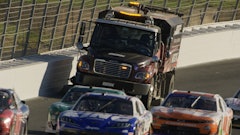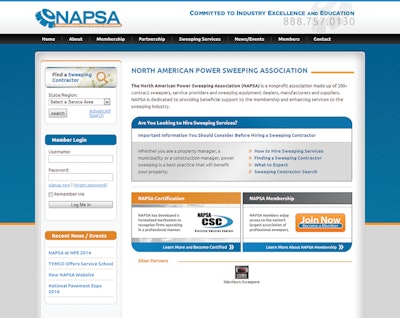
In a broad sense the North American Power Sweeping Association (NAPSA) focused its 2013 efforts and even 2014 plans to encourage and intensify communication and involvement among its more than 300 members.
NAPSA President Ken Lindsey, Commercial Power Sweep, NAPA, CA, said perhaps the most significant change in 2013 was the completion of a long-planned upgrade to its website, www.powersweeping.org. He says NAPSA website development team not only improved the appearance and feel of the website, it also added some new elements.
“With the ever-changing and fast pace of digital media you need to update on a constant basis, and our website was stagnant for too long a time,” Lindsey says. “There was some awkwardness on the part of the old website and that’s now gone. The website development team really improved the look of the site. It’s more modern.”
The site, which receives hundreds of visits from people looking to hire sweeping services, includes its Contractor Locator on every page and also includes a more informative “How to Hire Sweeping Services” section to benefit buyers.
For NAPSA members NAPSA added a blog to the site titled “Sweepers Exchange Forum,” which provides a place members can ask questions or just make other member aware if industry issues.
“The goal is to increase communication within the membership by adding a blog site on it and we think that’s going to be a valuable member benefit,” Lindsey says, adding that the website now makes it easier for members to learn about all the member benefits available to them.
Mentoring Members
Lindsey says that for 2014 NAPSA will make it a point to expand its mentoring program which pairs a seasoned NAPSA member with a new member. “The goal of that program has always been to help the new member in general but we’re going to make a special effort to have our mentors make new members aware of all that NAPSA has to offer. We want to make sure our mentors are available for that new people to introduce them to the things that can really help them,” Lindsey says. “A good example is National Pavement Expo, which is huge for our companies and our organization, but a lot of our members don’t attend so they’re not taking full advantage of what benefits are available. We think that’s mainly because they just aren’t aware of what we offer. We hope through mentoring to introduce them to all that’s available and encourage them to take advantage of as many benefits as possible.”
He says that through the mentoring program NAPSA will encourage members to bring new ideas to the organization.
“We have a lot of multi-generational sweeping companies as members but we do have new fresh blood, too. New people are joining the industry and we hope to tap into them to expand the idea of NAPSA. We hope to tap into whatever resources we can that our membership has.”
He says that as new members bring new ideas, they will become more involved. If, for example, an idea warrants development, NAPSA could create a team – much like the website development team – to look into it.
“That not only helps us as an organization but then people feel they have a stake in the game. Rather than being a stagnant player they become active in the industry.”
And to make member involvement even easier and more palatable to people already busy running their own business, Lindsey says NAPSA has altered the structure of some of its committees and groups. He said groups are now goal-focused or topic focused so that people who agree to serve will only serve for the duration of a project. Lindsey says the website development team is a good example, the team being dismantled now that the website improvement has been completed.
“They got the project done and now they’re done,” he says. “We think that’s easier for people to commit to than something that’s open ended.”
Industry Challenges
Lindsey says the industry faces a number of challenges, most importantly the problem of third party providers which he termed “really discouraging.”
“I’ve lost a couple of accounts to third party providers but I haven’t experienced that issue as bad as some people on the East Coast have. But that problem is not going away soon and it’s really deteriorating the quality of our service.”
He says NAPSA does encourage members who work with third party providers to maintain service and job quality. “But that’s very difficult with jobs being taken from us and sold back to us at half the price. Where are we going to make up that money?” he asks.
He says the too-common practice of telling operators to skip sections of a parking lot every other night or to only spend a certain amount of time on a parking lot sends a message to operators that that approach is acceptable on every job.
“As owners don’t want to jeopardize the quality of your overall service by cutting service to some clients but it’s often the only way you can do it.”
“It’s something people need to stand up against more than I think we’re doing right now,” Lindsey says. “It’s okay to say ‘No’ to these people and if enough people say ‘No’ to them things can change.”
He says he is concerned that if the sweeping industry lets the practice continue it will spill over into other areas of maintenance such as sealcoating and landscaping where third party providers are now just testing the waters.
“Third party only comes down to bottom dollars,” he says. “They have no interest in anything else.”
He says another challenge – especially on the West Coast – is regulatory issues concerning the California Resource Board (CARB). Lindsey says at least 16 other states are adopting standards similar to those California has for trucks and buses and sweepers need to develop a unified compliance strategy. “This is not going away,” he says. “It’s headed east and people need to be aware of what’s coming down the road in their own states.”
Lobbying the EPA?
While in most cases businesses are opposed to regulation, Lindsey says NAPSA plans to work hard to encourage stronger regulation from an EPA standpoint of parking lot sweeping and city sweeping, which he says is “a requirement for sweeping success.”
“Some individual companies are lobbying in California but we’d like to develop a national partnership lobbying for that sweeping requirement nationwide,” he says. “Everything on the roadways usually ends up downstream and with budget cuts people have been cutting back on sweeping. Not only does it dirty our waterways but the debris on the pavement damages the roadways and we will be facing dire consequences if we don’t do something soon.”
He says that NAPSA, speaking as one industry voice, can influence national regulations that require pavement sweeping on a regular basis – which would help the communities, the environment and the sweeping industry.




![Pavement Awards 2025[main]](https://img.forconstructionpros.com/files/base/acbm/fcp/image/2024/05/PavementAwards_2025_main_.665883e4276e8.png?auto=format%2Ccompress&bg=fff&fill-color=fff&fit=fill&h=100&q=70&w=100)
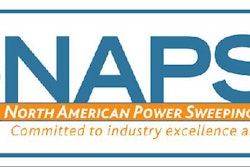
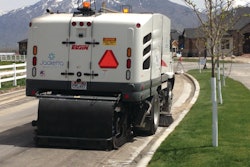
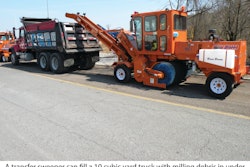




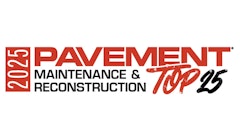
![Pavement Awards 2025[main]](https://img.forconstructionpros.com/files/base/acbm/fcp/image/2024/05/PavementAwards_2025_main_.665883e4276e8.png?ar=16%3A9&auto=format%2Ccompress&bg=fff&fill-color=fff&fit=fill&h=135&q=70&w=240)



